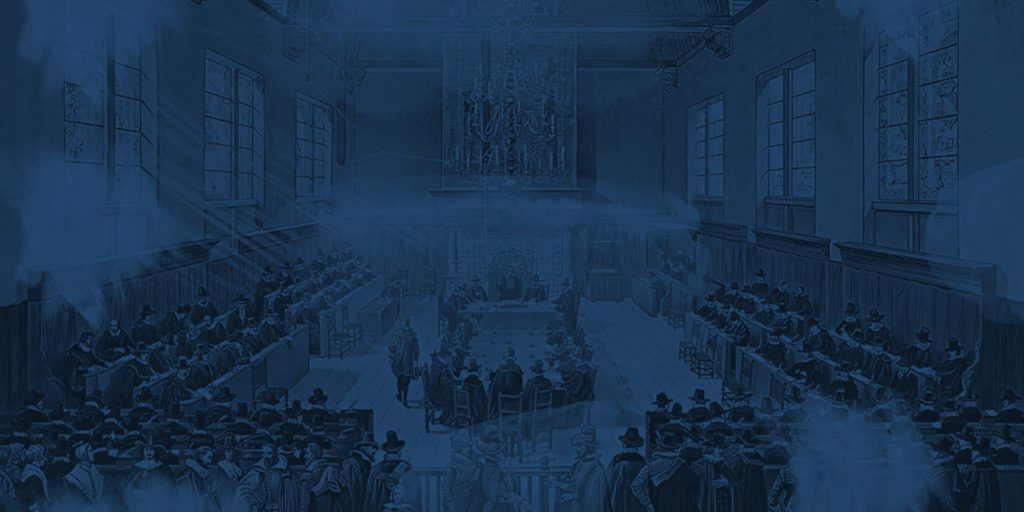
The Warmest Doctrine at Dort: The Preservation and Perseverance of the Saints
The new issue of  Credo Magazine focuses on Dort at 400. The following is an excerpt from Daniel R. Hyde’s article, “The Warmest Doctrine at Dort: The Preservation and Perseverance of the Saints.” Rev. Daniel R. Hyde has been the Pastor of Oceanside United Reformed Church in Carlsbad/Oceanside, CA since planting it in 2000 and also serves as an Adjunct Instructor at Mid-America Reformed Seminary and Puritan Reformed Theological Seminary. He is the author of 17 books including Welcome to a Reformed Church & God in Our Midst (Reformation Trust), From the Pen of Pastor Paul: 1–2 Thessalonians (EP Books), How Does Justification Make Me Joyful? (Reformation Heritage), and most recent Grace Worth Fighting For: Recapturing the Vision of God’s Grace in the Canons of Dort (The Davenant Institute). Currently he’s writing his doctoral dissertation at the Vrije Universiteit Amsterdam on John Owen’s theo-political theology of worship, a topic he’s contributed chapters to academic volumes by Ashgate and Brill. He’s written for Ad Fontes, American Theological Inquiry, Calvin Theological Journal, Mid-America Journal of Theology, Puritan Reformed Journal, and The Confessional Presbyterian.
Credo Magazine focuses on Dort at 400. The following is an excerpt from Daniel R. Hyde’s article, “The Warmest Doctrine at Dort: The Preservation and Perseverance of the Saints.” Rev. Daniel R. Hyde has been the Pastor of Oceanside United Reformed Church in Carlsbad/Oceanside, CA since planting it in 2000 and also serves as an Adjunct Instructor at Mid-America Reformed Seminary and Puritan Reformed Theological Seminary. He is the author of 17 books including Welcome to a Reformed Church & God in Our Midst (Reformation Trust), From the Pen of Pastor Paul: 1–2 Thessalonians (EP Books), How Does Justification Make Me Joyful? (Reformation Heritage), and most recent Grace Worth Fighting For: Recapturing the Vision of God’s Grace in the Canons of Dort (The Davenant Institute). Currently he’s writing his doctoral dissertation at the Vrije Universiteit Amsterdam on John Owen’s theo-political theology of worship, a topic he’s contributed chapters to academic volumes by Ashgate and Brill. He’s written for Ad Fontes, American Theological Inquiry, Calvin Theological Journal, Mid-America Journal of Theology, Puritan Reformed Journal, and The Confessional Presbyterian.
The Canons of Dort “prepared the way for a dry scholasticism which runs into subtle abstractions, and resolves the living soul of divinity into a skeleton of formulas and distinctions.”[1] This is how the well-known nineteenth century Reformed historian, Philip Schaff (1819–1893), described the Canons. Unfortunately, the caricature of “scholasticism” continues in us because of how we talk about this doctrine in cold, sterile ways and even how we live our lives presuming on the preserving work of God’s grace. Of all the points of Dort’s doctrine, the fifth point on preservation[2] and perseverance[3] is furthest from Schaff’s caricature. As Schaff’s contemporary, the Utrecht theologian Jan Jacob van Oosterzee (1817–1892) said, this doctrine was “defended at the Synod of Dort with such warmth.”[4] In the space that follows I intend to demonstrate how Dort expressed this doctrine in a warm way.
The Context of Perseverance and Preservation
The fifth point of doctrine opens with two articles of common (catholic) Christian conviction that form the context in which preservation and perseverance are discussed: we are freed from our slavery to sin but not from our struggle with sin.
Our Freedom From Sin
Article 1 links back to the previous points of doctrine when it says, “Whom God calls (third/fourth point), according to His purpose (first point), to the communion His Son, our Lord Jesus Christ (second point), and regenerates by the Holy Spirit” (third/fourth point). There’s a close and strong connection grammatically between those “whom” (quos) all this is true and the next statement: “He delivers also (“them indeed”; eos quidem) from the dominion and slavery of sin in this life.” This past tense, or, already aspect of our freedom from sin is exemplified in Romans 6 where “our old man was crucified[5] with [Jesus]” (Rom. 6:6) with the immediate purpose “that the body of sin might be destroyed” (Rom. 6:6).
Our Struggle With Sin
The same apostle who wrote Romans 6 also wrote Romans 7 and Philippians 3 that teach us another common truth: we still struggle with sin.[6] Article 1 concludes its statement of the biblical truth of our deliverance from sin this way: “though not altogether from the body of sin and from the infirmities of the flesh, so long as they continue in this world.” Sin’s dominion has been abolished; it’s no longer my master. Yet, sin’s corruption still affects me. Thus article 2 goes on to say: “Hence spring daily sins of infirmity, and hence spots adhere to the best works of the saints.” Since we have this ongoing struggle, article 2 goes on to say it “furnish[es] them with constant matter” to do four things.
First, “humiliation before God”: “Not as though I had already attained [the glory of the resurrection], either were already perfect” (Phil. 3:12). Second, “flying for refuge to Christ crucified”: “But what things were gain to me” in my former life according to the law and the flesh “those I counted loss for Christ” (Phil. 3:7). Third, “mortifying the flesh more and more by the spirit of prayer, and by holy exercises of piety.” In the memorable words of John Owen, “Be killing sin or it will be killing you.”[7] We don’t do this by force of our wills or the strength of our resolve. We mortify “through the Spirit.” The Holy Spirit is the one who sanctifies us freely and merely of his grace. But the means by which he does this work is through you and me.[8] The Canons tell us we mortify “by the spirit of prayer, and by holy exercises of piety.” Fourth, “pressing forward to the goal of perfection, till being at length delivered from this body of death, they are brought to reign with the Lamb of God in heaven.” We are to “press toward the mark for the prize of the high calling of God in Christ Jesus,” which is perfection (Phil. 3:14).
Perseverance and Preservation Defined
If article 2 were the last word, it would undoubtedly be true “by reason of these remains of indwelling sin, and the temptations of sin and of the world [that] those who are converted could not persevere in a state of grace if left to their own strength” (art. 3). We see something else, though, in Scripture, which article 3 states: “But God is faithful, who having conferred grace, mercifully confirms and powerfully preserves them therein, even to the end.”
The Remonstrants were of the opinion that “true believers are able to fall through their own fault into shameful and atrocious deeds, to persevere and to die in them; and therefore finally to fall and to perish.”[9] The issue, though, of such “if” language was viewing faith’s interaction with grace as a hypothetical condition of final perseverance. However, Paul speaks in Romans 8: “if so be it that the Spirit of God dwell in you…if Christ be in you…if the Spirit of him that raised up Jesus from the dead dwell in you” (Rom. 8:9, 10, 11). Thomas Schreiner comments that Paul’s purpose was not to cast into doubt the believers’ status but to assure: “εἴπερ (if) does not signify that some in the Roman community may be without the Spirit” and “εἰ (if) in the flow of the argument is another fulfilled condition” meaning “since.”[10] Article 3 affirms that in ourselves perseverance is an “iffy” proposition; but with God our preservation is assured.
The certainty of the saints’ salvation is confirmed by the adjectives Peter uses to describe it: “incorruptible” meaning it is imperishable and immortal, “undefiled” meaning it is pure, and “fadeth not away” or “unfading” meaning it does not lessen over time. The salvation is certain along with those who participate in it—the saved: “who are kept by the power of God” (1 Peter 1:5).[11] Peter uses a present participial verb “kept,” but it’s in the passive voice, meaning, God is the one active in guarding while believers are the recipients of this action.
All this is true because of the certainty of the Savior. He is faithful to who he is and what he has promised. He is faithful having conferred grace, [he] mercifully confirms and powerfully preserves them therein even to the end (1 Cor. 1:8–9; Phil. 1:6; 2 Thess. 3:3; 1 Peter 1:5; 5:10; Jude 24).
Read Daniel R. Hyde’s entire article in the new issue of Credo Magazine: Dort at 400.
Endnotes
[1] The Creeds of Christendom, ed. Philip Schaff, rev. David S. Schaff, 3 vols. (1931; repr., Grand Rapids: Baker Books, 1993), 1:515.
[2] conservat (arts. 3, 7, 14); conservantis (art. 4); custodia (arts. 8, 9).
[3] perseverantia (arts. 9, 15); perseverantiae (arts. 11, 12, 13).
[4] J.J. van Oosterzee, Christian Dogmatics: A Text Book for Academical Instruction and Private Study, trans. John Watson Watson and Maurice J. Evans (1870; fifth edition, London: Hodder and Stoughton, 1891), 664.
[5] Paul uses the aorist passive indicative συνεσταυρώθη.
[6] One pastoral question I’ve faced over the years is “why does God allow sin to still dwell in his children in this life?” One of the best answers I’ve read comes from Thomas Boston, “Why the Lord Suffereth Sin to Remain in the Regenerate?” in The Whole Works of the Larte Reverend Thomas Boston of Ettrick: Sermons and Discourses on Several Important Subjects in Divinity, ed. Samuel M‘Millan (Aberdeen: George and Robert King, 1849), 6:110–124.
[7] “Of the Mortification of Sin in Believers,” in The Works of John Owen, ed. William H. Goold, 16 vols. (1850–53; repr., Edinburgh: Banner of Truth, fifth printing 1993), 6:9.
[8] Manton once said, “For to dream of a mortification which shall be wrought in us without our consent or endeavours, as well as whilst we are sleeping, as whilst we are waking, is to delude ourselves with a vain fancy.” Manton, “Sermons Upon the Eighth Chapters to the Romans,” in Works, 12:73. The active nature of sanctification and holiness was expressed by Hendriksen, who said, “…the recipients of these favors [mentioned in vv. 1–11] must go into action.” William Hendriksen, Romans, New Testament Commentary (1980, 1981; Grand Rapids: Baker Book House, sixth printing 1989), 254.
[9] “Appendix H: The Opinions of the Remonstrants,” in Crisis in the Reformed Churches: Essays in Commemoration of the Great Synod of Dort, 1618-1619, ed. Peter Y. De Jong (Grand Rapids: Reformed Fellowship, 1968), 228. See also The Arminian Confession of 1621, trans. and ed. Mark A. Ellis, Princeton Theological Monograph Series 51 (Eugene, OR: Pickwick Publications, 2005), 112–113.
[10] Schreiner, Romans, 413, 414. See the further discussion in Kruse, Paul’s Letter to the Romans, 333, and Schreiner, Romans, 395, 409, 410.
[11] φρουρουμένους

